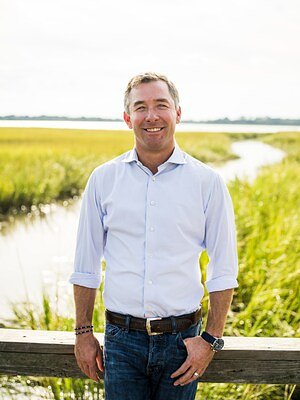
Beyond Compliance: Atlantic Packaging CEO Honored for Pioneering ‘Voluntary Mitigation’ in Industry
Wes Carter of Atlantic Packaging is redefining corporate sustainability with a proactive ‘voluntary mitigation offset’ program, earning him recognition as a leader in environmental stewardship and sparking a debate about the future of industry responsibility.
Beyond Compliance: Atlantic Packaging CEO Honored for Pioneering ‘Voluntary Mitigation’ in Industry
Charleston, SC – November 6, 2025 – Wes Carter, President of Atlantic Packaging, has been named the 2025 Individual of the Year by the Association of Fundraising Professionals (AFP) South Carolina Lowcountry Chapter. While many companies now tout sustainability initiatives, Carter’s recognition stems from a more radical approach: proactive environmental responsibility, embodied in the company’s innovative ‘voluntary mitigation offset’ program. This isn’t about simply minimizing harm; it’s about actively restoring ecosystems and setting a new standard for corporate environmental stewardship.
Carter received the award during National Philanthropy Day, acknowledging his leadership in driving sustainability and conservation. The AFP Lowcountry Chapter’s decision signals a growing recognition that true corporate responsibility extends beyond regulatory compliance and into genuine ecological restoration.
A Shift From Offset to Mitigation
For years, the corporate world has embraced carbon offsetting – investing in projects that reduce emissions elsewhere to balance out a company's own footprint. Atlantic Packaging is taking that concept a step further. Their ‘voluntary mitigation offset’ framework goes beyond neutrality, actively investing in projects that restore damaged ecosystems – reforestation, wetland preservation, and habitat restoration – effectively creating a net positive environmental impact.
“We saw an opportunity to not just lessen our impact, but to contribute to environmental healing,” explains a sustainability consultant working closely with Atlantic Packaging. “Many companies talk about ‘doing less harm,’ but Carter is focused on ‘doing more good.’ This is a fundamental shift in mindset.”
The program isn’t simply philanthropic. It’s integrated into Atlantic Packaging's core business strategy. The company invests a percentage of its revenue directly into these restoration projects, viewing it as a long-term investment in both the environment and the company’s reputation.
Beyond Carbon: A Holistic Approach
While carbon reduction is a component, Atlantic Packaging's mitigation program addresses a wider range of environmental concerns. The company’s projects focus on biodiversity, water quality, and habitat preservation – recognizing the interconnectedness of ecosystems.
“It's not just about the carbon footprint anymore,” says an environmental expert specializing in corporate sustainability. “Consumers and investors are demanding a more holistic approach, and companies like Atlantic Packaging are responding by investing in comprehensive restoration projects.”
The program includes partnerships with local conservation groups and universities, leveraging expertise and ensuring the long-term sustainability of the restoration efforts. One notable project involves restoring a critical wetland ecosystem, providing habitat for endangered species and improving water quality in a nearby river.
A Model for the Industry?
Atlantic Packaging’s approach isn’t without its critics. Some argue that ‘voluntary mitigation’ is a form of ‘greenwashing’ – allowing companies to continue environmentally damaging practices while touting their restoration efforts. However, industry analysts point to the company’s transparent reporting, rigorous project monitoring, and long-term commitment as evidence of genuine environmental stewardship.
“What sets Atlantic Packaging apart is the integration of this program into their core business strategy,” says a supply chain analyst. “This isn't a PR stunt; it's a fundamental shift in how they operate.”
The company's success is also prompting a broader debate about the future of corporate responsibility. Is ‘voluntary mitigation’ a viable alternative to stricter environmental regulations? Can companies truly balance economic growth with ecological restoration?
“There’s a growing recognition that relying solely on regulations isn’t enough,” says an anonymous source within the AFP. “Companies like Atlantic Packaging are demonstrating that it’s possible to be both profitable and environmentally responsible.”
Beyond the Award: A Commitment to the Future
For Wes Carter, the AFP Individual of the Year award is not an endpoint, but a milestone. He sees it as an opportunity to inspire other business leaders to embrace a more proactive approach to environmental stewardship.
“We believe that companies have a responsibility to not just minimize their impact on the environment, but to actively contribute to its restoration,” Carter stated in a recent interview. “We hope that our program can serve as a model for other companies to follow.”
Atlantic Packaging is currently working on expanding its ‘voluntary mitigation offset’ program, with plans to invest in new restoration projects and share its knowledge with other companies. The company is also exploring innovative technologies to monitor and measure the environmental impact of its efforts, ensuring transparency and accountability.
As consumer demand for sustainable products continues to grow, and investors increasingly prioritize environmental, social, and governance (ESG) factors, companies like Atlantic Packaging are poised to lead the way in a new era of corporate responsibility. The company’s innovative approach, coupled with its commitment to transparency and accountability, is setting a new standard for environmental stewardship and inspiring a broader debate about the future of industry responsibility. Whether this model will become widespread remains to be seen, but Atlantic Packaging is undeniably sparking a crucial conversation about the role of business in creating a more sustainable future.
